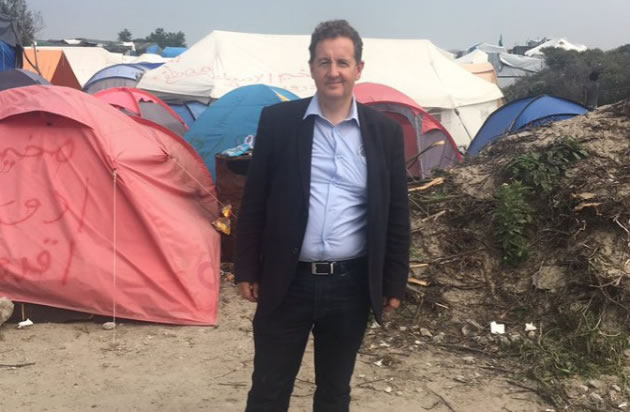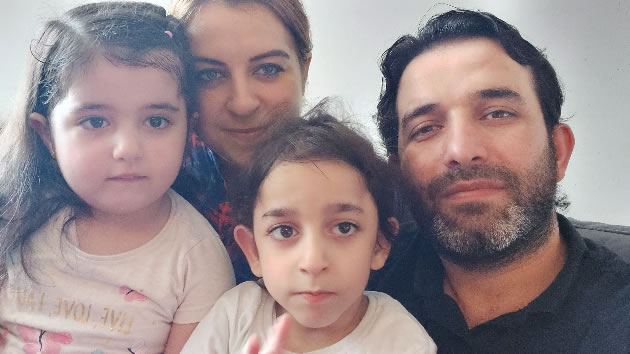Ealing Fails to Meet Target for Rehousing Refugee Families
Council leader pledges to do more saying it is a moral commitment

Cll Julian Bell at the refugee camp in Calais
July 17, 2020
Mohamad and Sherin Rashid could never have imagined when they fled Syria in 2013 that they would spend their days at their children’s favourite place, Walpole Park in Ealing, seven years on.
From Aleppo, to Afrin in Syria Kurdistan, to Turkish cities including Kilis, Istanbul and Ankara, the Kurdish couple have now found their new home in West Ealing under the UK’s Vulnerable Persons Resettlement Scheme, specifically designed for those in the Middle East region escaping conflict in Syria.
Ealing Council pledged to rehome 20 refugee families by 2020 as part of the government’s wider commitment to resettle 20,000 people affected by the devastating war in the UK from 2015.
But the local authority’s target has been stopped short by the coronavirus pandemic. So far having welcomed 13 households to the borough, a further seven similar to Mohamad and Sherin, and their children Jalal and Jannet, are continuing to wait overseas until they can rebuild their lives in west London.
For the Rashids, it was daunting coming to the UK.
“At the beginning we were quite afraid of coming here because we didn’t know what we would find and how they would treat us,” Mohamad explained.
“But then as soon as we got here we saw the treatment of people was different. And because we have experienced discrimination and racism as Kurds in Syria, in Turkey, so we had this concern, but then soon we realised here they treat people more humanely.”
Before the outbreak of the Syrian civil war, life for the couple was “fine”, Mohamad, now 33, had a job, they had a house, a car, but with the conflict came discrimination for the Kurds, a minority group in Syria. They were forced out of Aleppo to Afrin, where Sherin, now 27, gave birth to twins, despite there being no hospital in the city.

The Rashid family
Tragically one of the twins died one day after the birth, and the couple had no choice but to cross the border into Turkey seeking medical help for their surviving new-born baby girl.
Mohamad, who also speaks Turkish, said: “We went to a city called Kilis, we went into five hospitals but they refused us. Then we went to another city, a bigger hospital in Antep, and then we were seen in that hospital.”
He added: “With regards to the health system in Turkey, it was very different from Syria…And because as refugees we were having added difficulties in accessing the health services there.
“The doctor wouldn’t discuss any problems, they would just do whatever they think is best without informing the parents. I had to run after the doctors to understand what was happening all the time. They wouldn’t respect us.”
Their daughter was treated for six to seven months before she died, with doctors saying the Rashids had taken her to the hospital too late to get help.
Life in Turkey was difficult for the couple, and after the birth of their son Jalal, now four-years-old, who suffers from serious medical conditions, the family decided to apply to the United Nations [UN] for resettlement in another country.
Mohamad explained: “He [Jalal] had this problem in his lungs so he needed very special medical care. There were no good hospitals in that city so we moved to Istanbul and then we moved to Ankara looking for treatment for Jalal. Because life was very difficult and we couldn’t access the proper treatment that is when we applied for resettlement.”
The family were offered the UK as their next home, and eventually moved to Ealing in September 2018 after a two-year process.
Local authorities can volunteer to re-home refugees, and as a participant in the scheme, Ealing Council receives pre-set funding per person resettling in the borough from the Home Office.
Officers organise accommodation and intensive support when the families arrive such as helping with translations, registering the children at school, GP surgeries, assisting with bank accounts and English classes to name a few. For Jalal this has also meant making sure he gets the medical attention he needs.
Before the pandemic, Mohamad and Sherin would meet with volunteers to help practise their English (a service which is now offered ‘virtually’), and the father, a former tailor, is aiming to get back to work once his language confidence grows.
Jalal and three-year-old Jannet both loved attending nursery before lockdown and Jannet would “cry and cry” when she had to leave each day. The nursery now drops off games for the children to continue learning, but the family’s support has been hit by changes during the pandemic.
“We had to adjust, it impacted us like it impacted everyone but mainly because of the children, the children were having a good time in the nursery, they were socialising, playing with other kids learning, and suddenly everything stopped,” Mohamad explained.
“And the medical appointments also some of them stopped so the whole support around Jalal also had to re-adjust.
“We’re very scared because Jalal has a serious chest problem, respiratory problem…I would just leave the house maybe once every week, once every two weeks to go shopping. Every time I would leave I would be very careful and even then I would be afraid of infecting Jalal.”
The family felt the resettlement process before coming to the UK was difficult, and while two years was a long time to wait, they knew others were waiting four, five or six years to be relocated. The waiting was the hardest part, Mohamad believes.
For other refugees who are now being held back even further due to the global pandemic, he added: “I can imagine now with the current situation life can be even more difficult and people may be struggling a lot…
“It’s very difficult all this waiting time, but here from the scheme in the UK it’s very good, I can’t compare to other places but the services and support we’re getting is very good.”
Council leader Julian Bell told the Local Democracy Reporting Service that the biggest challenge of welcoming refugees was finding sustainable housing.
Of the 48 people re-homed by the council since 2016, the majority were found private rented accommodation, while two people were housed in sheltered housing.
Council officers are given around six to eight weeks time to prepare for their new residents, from the time it is agreed with the Home Office they will move to the borough – often coming straight from a refugee camp.
Cllr Bell said: “A lot of them are getting them places in private rented sector, which we have to do for everybody these days because we don’t have sufficient council housing.
“We have had members of the community, businesses, come to us and offer properties sometimes specifically for refugees. That has sometimes been the solution but it is ad hoc.
He added: “What we have done is really a drop in the ocean. Yes it will mean the world for those families who we helped, but it is not enough we need to do more. We will continue to try…
“It is frustrating we have been stopped by Covid-19 in making the progress we wanted to and hitting the target, but this has never been easy from the start.”
According to the council boss the authority has also welcomed more than 120 unaccompanied asylum seeking children in the last two years. His own “shocking” experience of visiting the Calais camp and witnessing the conditions was a key motivation for signing up to help.
Ealing also already is home to the largest Syrian population in the country.
Despite recognising the financial pressures on Ealing Council, Cllr Bell said welcoming refugees was a “moral commitment”, adding: “This is just something we have to do, because it’s just wrong to let those people languish in those camps and not give them a new start and a safe place to live.”
As parents the Rashids hope Jalal and Jannet will be given the chance they never got in Syria to study, and go on to be “useful” here in the UK as lawyers, or doctors and contribute to society.
And Mohamad has a piece of advice for other refugees waiting overseas to come to the UK.
“People shouldn’t be afraid of coming here, it will definitely be better than the place they’re coming from,” he said.
“We are very thankful to the people that live here.”
Anahita Hossein-Pour - Local Democracy Reporter